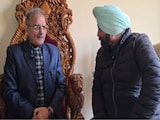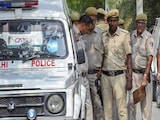Former Russian state TV journalist Marina Ovsyannikova, who made headlines last year with a placard that read "stop the war" during a news broadcast, may have been poisoned in France. Ms Ovsyannikova was hospitalised on Thursday after suddenly falling ill, according to CBS News. She later told the police that she felt unwell after opening the door to her Paris apartment and noticing a powder substance. Forensic police were sent to examine her home. An investigation has been launched by the police after a complaint was filed by Ms Ovsyannikova, the outlet further said.
Christophe Deloire, director general of Reporters without Borders, said he had met Ms Ovsyannikova after her malaise outside her Paris apartment.
Mr Deloire, writing on X, formerly Twitter, said the possibility Ms Ovsyannikova had been poisoned had not been ruled out, though she was feeling better since the incident.
Reporters without Borders was instrumental in getting the 45-year-old journalist and her 12-year-old daughter out of Russia after the incident last year.
Ms Ovsyannikova was initially fined 30,000 roubles ($270) and placed under house arrest for staging a protest, but she later escaped to France with her daughter.
Last week, a Russian court sentenced Ms Ovsyannikova to eight and half years in jail in absentia. She was found guilty of "spreading knowingly false information about the Russian Armed Forces", according to a statement posted by the court on Telegram.
Ms Ovsyannikova had staged her original protest less than three weeks after Russia invaded Ukraine on February 24, 2022, in what it called a "special military operation".















